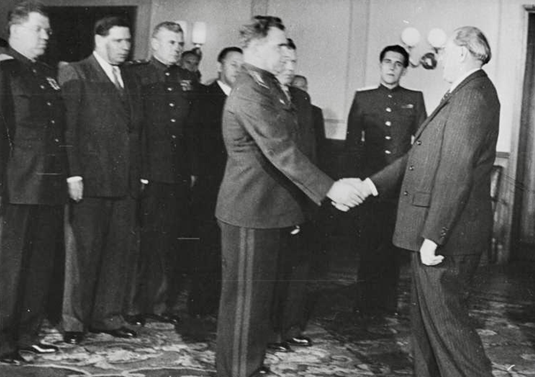Youth Was Tempered in Battles
- Maria A. Kithcart

- Jan 28, 2022
- 2 min read
Updated: Oct 5, 2025

Pictured: Soviet-era journal Za Rulyom (Behind the Wheel), No. 8 August 1968 edition; Marshal V. I. Chuikov’s article titled “Communists, Forward!” (Kommunisty, Vpered!); Cover art for Chuikov’s book Youth Was Tempered in Battles (Zakalyalas' Molodost' v Boyakh). This particular copy of Chuikov's book was inscribed by the author to Valentin Osipovich Osipov, who served as the Editor-in-Chief of the Young Guard Publishing House during that time, dated 1 August 1968.
As a researcher, there is great satisfaction when finding resources that align with each other chronologically. Here is one example of such an alignment—the August 1968 journal Behind the Wheel featured a 3-page article written by Marshal Chuikov in which he highlighted his experiences during the Russian Civil War, his joining the Communist Party as a 19-year-old, and his role in the military beyond those times. The introduction to the article mentions Chuikov’s newly published book, Youth Was Tempered in Battles, which was released earlier in 1968. Although I do not have access to an electronic translation of this book and I am currently learning to read Russian, he shared about the Russian Civil War in his work titled From Stalingrad to Berlin, an excerpt of which is provided here:
“I also understood that new, more severe tests awaited me, because the situation at the front was very difficult and alarming - the Nazis, having superiority in tanks and aircraft, were rushing to the Volga, to Stalingrad, regardless of losses. I was ready for any challenge. My youth was tempered in battles on the fronts of the Civil War, I had moral guidelines—glorious commanders and commissars who live in memory from the time of the struggle against [Alexander] Kolchak (a former admiral in the Imperial Russian Navy who was a “White” army commander).
Then, at the beginning of 1919, having arrived in Kazan with a certificate of completion of the Kraskom courses, I was appointed assistant commander of the 40th regiment for combat units. Soon, two marching companies of this regiment were presented for review to the Commander of the 2nd Army, Vasily Ivanovich Shorin, whose headquarters was in Sarapul. I brought these companies there on a blizzard day in February, but I was hot.
Commander Shorin, a strict and demanding commander, stood surrounded by experienced, gray-haired combatants, and in front of them some boy showed the combat readiness of the companies, one hundred and fifty people each. If one of them falls off his feet, he makes a mistake in a rifle technique—and a failure.
However, the fighters themselves felt the responsibility of the moment, pulled themselves up. The same spring, which is called military partnership, worked in them. All commands are carried out diligently, smoothly, clearly. A turn, another turn, moving in a deployed formation, again curled up in a column. I'm glad—not a single failure. And how clumsy they were in the ranks two months ago! Especially that youngster from the second company…
Believers try to be gloomy, [but] when they look at me, they hide smiles in their mustaches. I know, I feel that my youth makes them laugh, but I have nowhere to hide my reciprocal smile—my mustache has not grown yet.”



